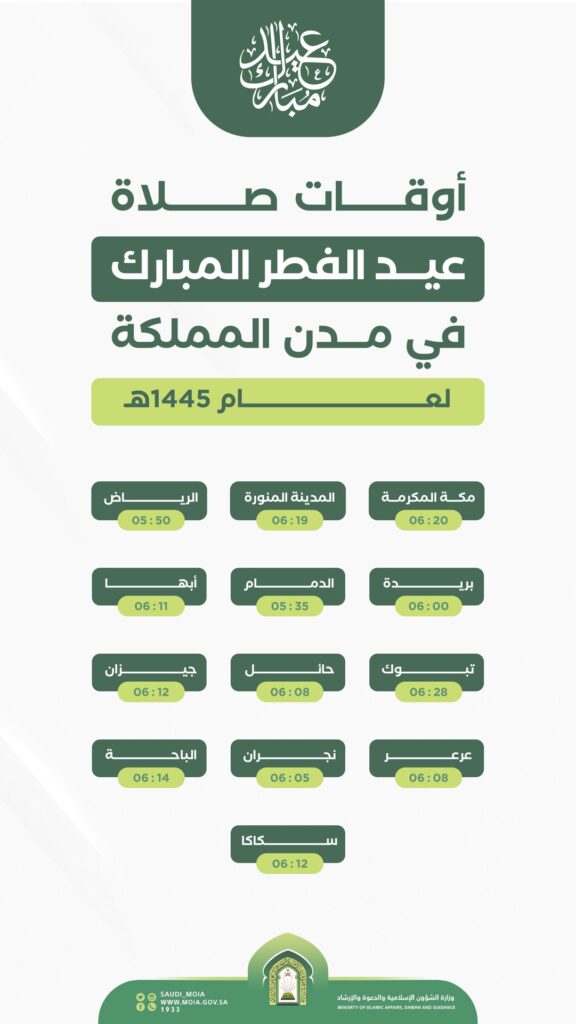Eid Al-Fitr, the festival of breaking the fast, is an eagerly anticipated occasion celebrated by Muslims worldwide. In Saudi Arabia, the Ministry of Islamic Affairs, Dawah and Guidance plays a crucial role in disseminating information regarding the prayer times for Eid Al-Fitr across the Kingdom. As the holy month of Ramadan draws to a close, Muslims eagerly await the announcement of prayer times to mark the joyous occasion.
Significance of Eid Al-Fitr
Eid Al-Fitr holds immense significance in Islam, symbolizing the completion of Ramadan, a month of fasting, prayer, and reflection. It is a time for Muslims to express gratitude to Allah for the strength and perseverance shown during the fasting period. Additionally, Eid Al-Fitr marks the beginning of Shawwal, the tenth month of the Islamic lunar calendar, signifying new beginnings and spiritual rejuvenation.
Announcement of Eid Prayer Times
In accordance with Islamic tradition, the Ministry of Islamic Affairs, Dawah and Guidance in Saudi Arabia meticulously calculates the Eid prayer times based on the Umm al-Qura calendar. This calendar, established by astronomical calculations, ensures accuracy in determining the timing of religious events, including Eid Al-Fitr.
For the year 2024, the Ministry has officially declared the Eid prayer times across various cities and governorates in Saudi Arabia. These timings are meticulously determined to align with the principles of Islamic jurisprudence and tradition.
Eid Al-Fitr 2024 Prayer Times in Saudi Arabia
Makkah
- Prayer Time: 06:20 AM
Madinah
- Prayer Time: 06:19 AM
Riyadh
- Prayer Time: 05:50 AM
Buraidah
- Prayer Time: 06:00 AM
Dammam
- Prayer Time: 05:35 AM
Abha
- Prayer Time: 06:11 AM
Tabuk
- Prayer Time: 06:28 AM
Hail
- Prayer Time: 06:08 AM
Jazan
- Prayer Time: 06:12 AM
Arar
- Prayer Time: 06:08 AM
Najran
- Prayer Time: 06:05 AM
Albaha
- Prayer Time: 06:14 AM
Sakaka
- Prayer Time: 06:12 AM

Celebrations and Traditions
Eid Al-Fitr is not just a religious observance but also a time of celebration, unity, and generosity. Following the Eid prayer, families and friends come together to partake in festive activities and traditions. These may include:
Gatherings
Muslims gather in mosques and open spaces to perform the Eid prayer collectively, fostering a sense of community and togetherness.
Feasts
Elaborate feasts are prepared, featuring a diverse array of traditional dishes and delicacies. It is customary for families to share meals with neighbors, relatives, and those less fortunate, spreading joy and goodwill.
Exchanging Gifts
The exchange of gifts is a cherished tradition during Eid Al-Fitr, symbolizing love, generosity, and friendship. Gifts are exchanged between family members, friends, and colleagues as tokens of appreciation and affection.
Sweets and Treats
Indulging in sweets and treats is synonymous with Eid celebrations. From traditional desserts like baklava and kunafa to homemade delights, sweets add sweetness to the festivities and are enjoyed by people of all ages.
Conclusion
Eid Al-Fitr is a time of spiritual renewal, joy, and gratitude for Muslims around the world. In Saudi Arabia, the Ministry of Islamic Affairs, Dawah and Guidance ensures that the Eid prayer times are communicated accurately to facilitate smooth celebrations across the Kingdom. As Muslims come together to mark the end of Ramadan and the beginning of Shawwal, they embrace the spirit of unity, generosity, and compassion.
